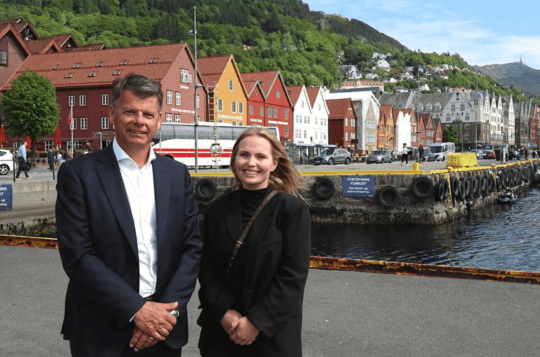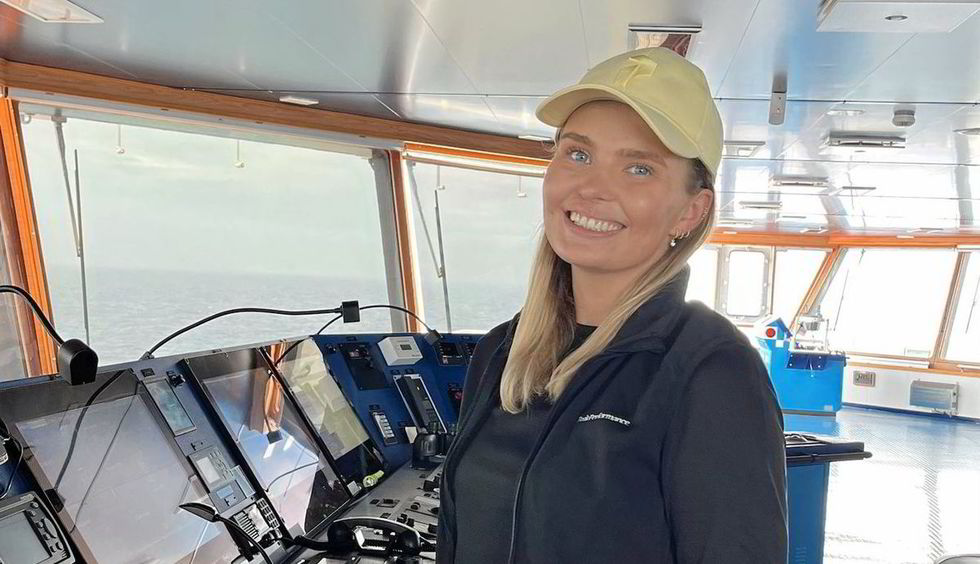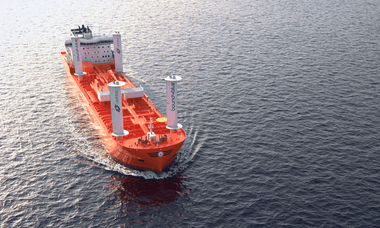The below is a translated version of an article in the Norwegian shipping business media ‘Kystens Næringsliv’,
published on July 3, 2023. Written by Stig Erik Elliot.
Recently, the Norwegian Maritime Forum and industry media Kystens Næringsliv announced their nominees for the ‘Maritime Municipality of the Year’ award. Bergen is one of the nominees due to the city’s strong shipping community. However, CEO Harald Fotland finds that the general public lacks knowledge of the maritime industry’s significant impact.

"Most people remain unaware of the multitude of job opportunities created, the immense value generated, the expertise contributed, and the far-reaching ripple effects of this industry"
says Fotland, receiving approving nods from Haugen.
Prejudices
While Fotland is Odfjell’s CEO, responsible for leading a shipping company with a turnover of 12 billion NOK and an operating profit of 2.2 billion NOK last year, Malin Gåsvær Haugen recently had her first trip as a 3rd officer on one of the company’s chemical tankers.
She has dreamt of a seafaring life since she was young. Both her grandfathers were sailors, and Malin grew up hearing stories about their experiences.
"Today people have little knowledge about the industry unless they have family members working in it. It’s a shame," she says.
Fotland suggests that biases associated with shipping may contribute to this lack of awareness.
"When people hear the term 'shipowner,' they often think of whiskey glasses, cigars, and names like Anders Jahre and Hilmar Reksten. That's not how I perceive the industry. Those involved in shipping are passionate about the business, about the local community, and they want to create something."
Significant transformation
Fotland took over as CEO of Odfjell in May 2022, but he has a lengthy relationship with the company. As Odfjell's chief of staff, he oversaw a significant transformation that culminated in 2015. Odfjell was not profitable, and had sky-high debt and expenses. Thus, 80 positions out of 230 at the headquarters had to be eliminated. Today, a significant number of these positions have been reinstated.
Odfjell's operations in Bergen currently employ over 170 employees who operate around the clock on contracts and tanker operations, transporting over 15 million tons of edible oils, hand sanitizers, and 600 other liquid substances and chemicals worldwide each year.
The fleet of around 80 vessels employs approximately 1,600 seafarers, some of them Norwegian like Malin, others foreign. The fact that Norwegian shipping companies employ foreign seafarers has been used to argue against the industry in terms of its significance domestically. This is a concept that does not sit well with Fotland:
“The notion that Norwegian shipping companies employing foreign seafarers diminishes the industry's domestic significance is too simplistic. One must consider the interconnections and what is created throughout the maritime value chain."
Ripple effects
Highlighting the ripple effects within the industry, Fotland cites industry mogul Trond Mohn's journey and the development of Frank Mohn, later known as Framo. Beginning as a pump supplier for fishing vessels, the company experienced remarkable progress when it expanded to become a supplier to the shipping industry.
"Odfjell alone relies on somewhere between 2,000 and 2,500 pumps from Framo. If we include companies like Utkilen, Seatrans, Hansa Tankers, and Westfal-Larsen, the Bergen-based shipping companies have purchased pumps of considerable value from Framo. We are dependent on and develop each other in the maritime industry," says Fotland.
Good training
Malin Gåsvær Haugen has experienced what she believes to be one of Odfjell's other competitive advantages: solid training and the willingness to invest in Norwegian youth seeking a career at sea.

Malin Gåsvær Haugen on the bridge during a crossing of the Pacific Ocean.
After sailing for a year on a frigate in the Norwegian defense forces, she obtained a bachelor's degree from the University of Southeast Norway. Alongside her studies, she worked at Grieg Green to learn more about how the industry operates. Through other students she heard about Odfjell and how the company work with its cadets.
"I felt Odfjell was a good choice as it offered the safety of sailing with several Norwegians and had a positive reputation for training. And I haven't regretted my choice. You receive good support, and people are treated well."
Land-based job
Even though Haugen has chosen to pursue a master's degree at the University of Southeast Norway in order to obtain a land-based job in the future, she emphasizes that a land-based career is not in her immediate plans:
"I intend to continue sailing even after completing my master's. When you work on board you're away for a long time, but you also have long periods of leave. That suits me."


Fotland believes that Haugen's combined experience at sea and theoretical background will position her uniquely among other graduates.
"Among those working on land in the core business, about half have experience at sea, while the other half have a theoretical background. Malin will have both. She will be able to choose from a variety of jobs if she decides to go ashore."
Significant growth
Although Bergen holds a unique position with one of the most comprehensive clusters in the world for chemical tankers, Fotland emphasizes that the city also has a strong shipping community within most segments.
With players like Grieg, Jebsen, Wilson, and several others, Bergen's shipping cluster has over 500 Norwegian-registered ships and around 40 active shipping companies involved in offshore, regional, and international operations.
In addition, there are world-leading supply companies and a strong environment for both maritime insurance and financing.
"There is significant growth within and around the shipping companies," Fotland concludes.


